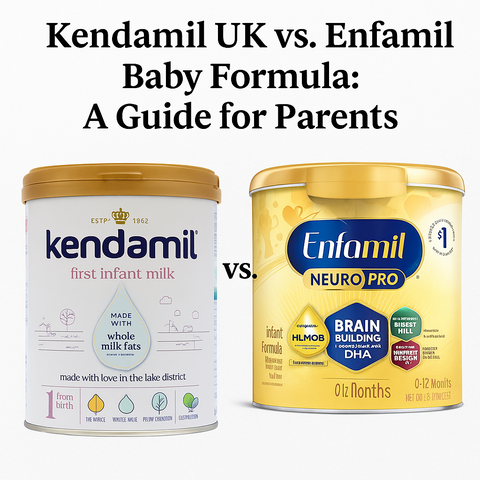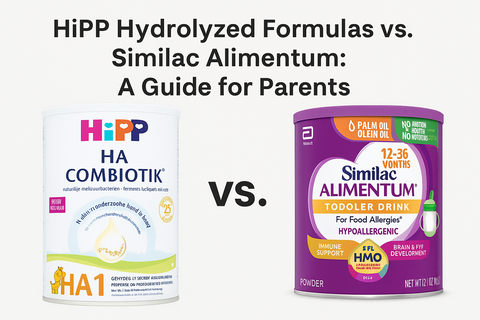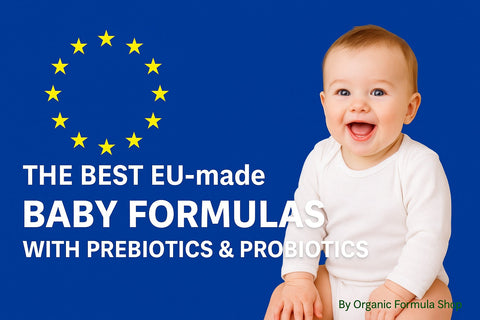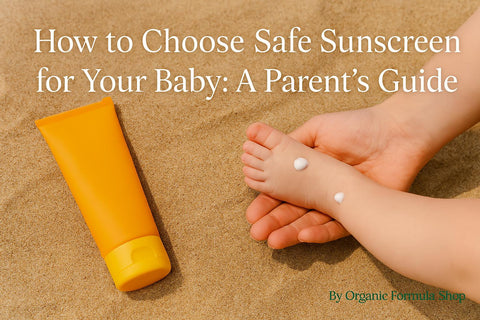Fun Facts About EU-Made Premium Formulas: Quality, Standards, and Benefits
When it comes to nourishing your baby, only the best will do. That’s why EU premium formulas have captured the hearts of parents worldwide. Known for their exceptional quality, stringent regulations, and commitment to clean ingredients, European baby formula sets the benchmark for infant nutrition. Whether you’re a new parent, a caregiver, or simply curious about high-quality baby formula, this blog post is filled with fun facts about baby formula, insights into EU formula standards, and the many benefits that make these products unique.
In this article, we’ll dive into the world of premium infant formula made in the EU. From the farm fresh ingredients in organic EU formula to rigorous safety testing and eco-friendly practices, you’ll discover why these formulas are trusted globally. So, grab a cozy drink (or a baby bottle!) and let’s uncover the wonders of premium EU formulas!
Why EU Premium Formulas Are a Parent Favorite

The demand for EU-made baby formula is skyrocketing in the US, and it’s easy to see why. Parents seek high-quality baby formula that aligns with their values: clean ingredients, top-tier safety, nutritional excellence, and ethical production. The EU delivers on all fronts, producing premium infant formula under the world’s strictest regulations. These formulas are crafted to give babies the best start in life while prioritizing sustainability and animal welfare.
What makes these formulas so special? It combines innovation, experience, tradition, and a deep commitment to quality. Let’s start with some fun facts about baby formula that’ll spark your curiosity!
Fun Facts About EU-Made Baby Formula
Baby formula might seem straightforward, but there’s a world of fascinating details behind EU premium formulas. Here are some fun facts about EU-made baby formula to hook you:
- Historical Milestone: The first commercial baby formula was born in Europe in the 1860s, thanks to German chemist Justus von Liebig. His powdered formula paved the way for today’s high-quality EU standards
- Strict Organic Standards: EU baby formulas labeled as organic must meet stringent European Commission regulations, ensuring no artificial preservatives, synthetic hormones, or GMOs are used, resulting in a "cleaner" product than some non-EU formulas.
- Lactose as the Carb: The EU mandates that at least 30% of carbohydrates in baby formulas come from lactose, the primary carbohydrate in breast milk, and bans certain sugars like corn syrup, common in some non-EU formulas.
- DHA is a Must: Since 2020, EU regulations have required all infant formulas to include Docosahexaenoic acid (DHA), an omega-3 fatty acid crucial for brain and eye development, in specific amounts, unlike some regions where DHA is optional.
-
Age-Specific Stages: EU formulas are uniquely categorized into stages to match the changing nutritional needs of babies as they grow, making it easier for parents to choose the right formula.
Pre (for newborns, often with lower protein for delicate digestion), Stage 1 (0-6 months), Stage 2 (6-10 months), Stage 3 (10+ months), and Stage 4 (12- 36 months). - Goat Milk Options: The EU offers goat milk-based formulas, like Hipp Goat, Holle Goat, and Kendamil Goat Formulas, popular for babies with cow’s milk sensitivities, an option less commonly available than in the US market.
- Grass-Fed Goodness: Many EU formulas, such as HiPP and Holle, use milk from grass-fed cows, which some believe provides a more natural nutrient profile.
- No Heavy Metal Worries with Rigorous Safety Checks: The EU enforces stricter limits on heavy metals (like lead and mercury) in baby formula compared to some other regions, ensuring safer products for infants. For example, HiPP conducts up to 260 safety checks on every batch, including tests by independent institutes, surpassing statutory requirements. From soil selection to harvest, HiPP collaborates closely with organic farms, releasing ingredients only after lab tests confirm perfection, earning the trusted HiPP Organic Seal, as Stefan Hipp personally vouches for its quality.
- Whole Milk Formulas: Unlike many US formulas that replace milk fat with plant-based fats, EU formulas use whole milk, retaining natural milk fat globule membrane (MFGM), which may support cognitive development.
- Hypoallergenic Innovation: EU brands like HiPP offer hydrolyzed formulas (e.g., HiPP HA) with broken-down proteins for babies with allergies, designed to mimic breast milk’s digestibility while reducing allergic reactions.
- Biodynamic Brands: Many EU formulas, like Hipp, Holle, and Kendamil, are certified biodynamic, meaning they’re produced using sustainable farming practices that go beyond organic, emphasizing soil health and animal welfare.
- No Artificial Flavors: EU regulations strictly prohibit artificial flavors or sweeteners in baby formulas, ensuring the taste remains as natural as possible, unlike some non-EU products that may use vanilla or other flavorings.
- Fortified with Prebiotics: EU formulas, such as Holle and Lebenswert, add prebiotics like galacto-oligosaccharides (GOS) to support gut health and mimic the prebiotic content of breast milk.
- Eco-Friendly Packaging: EU brands like Holle and HiPP often use recyclable or sustainably sourced packaging, reflecting the EU’s strong environmental ethos, with some even offering carbon-neutral production processes.
- Tailored Iron Levels: EU formulas adjust iron content by stage to prevent over- or under-supplementation, with lower levels in Stage 1 (0-6 months) to avoid digestive issues, unlike the one-size-fits-all approach in the US.
- No Palm Oil in Some Brands: EU formulas, like Lebenswert, avoid palm oil due to environmental and health concerns, using alternatives like sunflower or rapeseed oil for fat content.
- Microbiome Research Influence: EU formula brands collaborate with scientists to study the infant microbiome, leading to innovations like adding human milk oligosaccharides (HMOs) in some formulas to support immunity.
- Transparent Sourcing: EU regulations require clear labeling of ingredient origins, and brands like HiPP often highlight their use of milk from specific regions, like Bavarian farms, giving parents confidence in the supply chain.
- Anti-Reflux Formulas: The EU offers specialized formulas, such as HiPP Anti-Reflux, with added locust bean gum to thicken the mixture and help babies with spit-up issues, a feature less common in other markets.
- Long Shelf Life Without Preservatives and No Recent Recalls: Thanks to advanced sterilization and packaging techniques, EU formulas maintain long shelf lives without synthetic preservatives, ensuring safety and freshness for global distribution. Notably, it has been years since the last recall of a premium EU-made formula, such as HiPP, Holle, or Kendamil, reflecting the stringent safety protocols and quality controls enforced by the European Food Safety Authority (EFSA).
EU Formula Quality: Uncompromising Standards
When it comes to EU formula quality, the European Union sets an unmatched standard. European formula standards are enforced by the EFSA through strict EU formula regulations. Brands like Hipp Holle and Kendamil exceed those standards by their certifications. EU baby formula certifications have fascinating facts about Holle’s Demeter, Kendamil’s Red Tractor, and HiPP’s Organic Seal, showcasing their commitment to quality and sustainability. These certifications, Demeter, a global leader in biodynamic farming that treats farms as living ecosystems; Red Tractor, a UK assurance scheme ensuring traceable, safe, and sustainable food production; and the HiPP Organic Seal, a proprietary standard exceeding EU organic rules, set these brands apart, ensuring parents can trust the nutrition they provide their little ones.
Fun Facts About EU Baby Formula Certifications
Holle + Demeter Certification

- Biodynamic Trailblazer: Since partnering with Demeter in 1934, Holle has championed biodynamic farming, viewing farms as living organisms where soil, plants, and animals work in harmony for superior ingredient quality.
- Biodiversity Boost: Demeter farms supplying Holle foster 33% more plant and animal species than conventional farms, thanks to chemical-free practices that nurture ecosystems and pollinators.
- Cow Welfare Focus: Demeter forbids de-horning Holle’s cows, believing horns support digestion and vitality, ensuring happier, healthier animals grazing on organic pastures.
- Carbon-Negative Formula: Holle’s Demeter-certified formulas are climate-positive, sequestering more carbon than they emit through biodynamic soil practices like composting and crop rotation.
- Stringent Annual Audits: Demeter certification demands yearly inspections, ensuring Holle’s ingredients consistently meet the world’s toughest biodynamic standards, from seed to final product.
Kendamil UK + Red Tractor Certification

- Royal Endorsement: Kendamil, the UK’s only baby formula maker, holds Red Tractor certification and supplies the British royal family, a nod to its exceptional quality and reliability.
- Full Traceability: Red Tractor guarantees Kendamil’s milk comes from 220 UK farms, with every batch traceable from farm to formula, giving parents confidence in its origins.
- Sustainable Practices: Red Tractor farms prioritize eco-friendly methods, like reduced pesticide use and soil conservation, aligning Kendamil with environmentally conscious production.
- NASA-Inspired Safety: Kendamil’s Red Tractor certification incorporates NASA’s HACCP system, rigorously monitoring production to eliminate risks and ensure formula safety.
- Palm Oil-Free Promise: Red Tractor’s focus on natural ingredients means Kendamil skips palm oil, opting for vegetable oils that enhance nutrient absorption and sustainability.
HiPP + HiPP Organic Seal

- 260+ Safety Checks: HiPP’s Organic Seal guarantees each batch undergoes up to 260 safety checks, including independent lab tests, far surpassing EU organic standards for ultimate trust.
- Tougher Than EU Rules: The HiPP Organic Seal enforces stricter standards than EU organic regulations, banning synthetic fertilizers and ensuring residue-free ingredients like milk and fruits.
- 6,000 Farm Partners: HiPP’s Seal reflects sourcing from 6,000 family-run organic farms, with experts overseeing soil quality, cultivation, and harvests for pure ingredients.
- Stefan HiPP’s Pledge: The HiPP Organic Seal carries Stefan HiPP’s personal guarantee of contaminant-free formula, backed by continuous quality monitoring for parental peace of mind.
- Breast Milk Mimicry: HiPP’s Seal ensures formulas include probiotics and prebiotics inspired by over 55 years of breast milk research, closely replicating its gut-health benefits.
Lebenswert + Bioland Certification

- 100% Organic Mandate: Lebenswert’s Bioland certification, held since its 2009 launch by Holle, requires all ingredients to be 100% organic, exceeding the EU’s 98% organic threshold for stricter purity.
- Happy Cow Pastures: Bioland ensures Lebenswert’s milk comes from cows grazing freely on biodynamic farms in Germany and Austria, with no de-horning or synthetic hormones, prioritizing animal welfare.
- Soil Fertility Focus: Bioland farms emphasize fertile soils through natural compost and chemical-free practices, ensuring Lebenswert’s ingredients are grown in nutrient-rich environments.
- Rigorous Inspections: Bioland certification involves annual inspections by independent bodies like Ecocert, guaranteeing Lebenswert’s adherence to Germany’s highest organic standards.
- No Harmful Additives: Thanks to Bioland’s strict rules, Lebenswert formulas are free of GMOs, gluten, soy, and artificial sweeteners, offering a clean, digestible option for babies.
Tips for Choosing the Right European Baby Formula
With so many European baby formula options, picking the right one can feel daunting. Here are practical tips to find the perfect premium infant formula:
- Shop Premium: Go for a premium certified EU brand like HiPP, Kendamil, Holle, or Lebenswert.
- Match Your Baby’s Needs: For sensitive stomachs, try HypoAllergenic or formulas with Cow or goat’s milk, or go vegetarian.
- Check Ingredients: Opt for lactose-based formulas and avoid artificial additives
- Select the Right Stage: Ensure the formula suits your baby’s age (e.g., Stage 1 for 0 to 6 months)
- Compare: Check our baby formula comparison chart to help you understand the differences between our offered formulas.
- Consult a Pediatrician: Before switching to a new high-quality baby formula, get your doctor’s advice
Conclusion: The EU Formula Difference
From their fascinating history to their unmatched standards, EU premium formulas are a great example of quality, safety, and care. With European formula standards ensuring nutritional excellence, EU formula benefits delivering clean ingredients, and a commitment to animal welfare through certifications like Demeter, Bioland, and Red Tractor, these formulas are a parent’s dream. Add frequent safety testing, and it’s clear why high-quality baby formula from the EU is trusted worldwide and why so many parents opt for this choice.
Contact
Contact our dedicated customer support team for expert advice and guidance tailored to your baby's needs. They have earned hundreds of 5-star reviews from our customers, helping you to provide the best nutrition for your little one. Contact us here or shoot us an email at support@organicformulashop.com.




